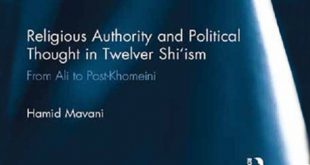The doctrine of imamate---that is, the rule of a particular individual over the community---is a central and pivotal concept in Islam generally, and in Shi`ism specifically. Scholars who have studied this concept have tended to emphasize one aspect of the doctrine of imamate to...
Read More »Two Shi‘i Jurisprudential Methodologies to Address Medical and Bioethical Challenges
The legal-ethical dynamism in Islamic law which allows it to respond to the challenges of modernity is said to reside in the institution of ijtihād (independent legal thinking and hermeneutics). However, jurists like Mohsen Kadivar and Ayatollah Faḍlalla have argued that the “traditional ijtihād” paradigm has reached its limits of …
Read More »Two Shi‘i Jurisprudential Methodologies to Address Medical and Bioethical Challenges
The legal-ethical dynamism in Islamic law which allows it to respond to the challenges of modernity is said to reside in the institution of ijtihād (independent legal thinking and....
Read More »Religious Authority and Political Thought in Twelver Shi‘ism: From Ali to Post-Khomeini
This book is a detailed theoretical study of the doctrine of leadership (Imamate) in Twelver Shi‘i Islam. Hamid Mavani provides not only a traditional perspective on Imamate but also theological, mystical, and...
Read More »Analysis of Imam Khomeini’s Proofs for Al-Wilaya al-Mutlaqa (Comprehensive Authority)
Based on the traditions discussed here, Ayatollah Khomeini asserts with certitude that all the power and authority (al-wilaya al-mutlaqa) that was vested in the Prophet and the infallible Imams now devolves upon the...
Read More » Ijtihad Network Being Wise and Faithful Muslim in the Contemporary World
Ijtihad Network Being Wise and Faithful Muslim in the Contemporary World




